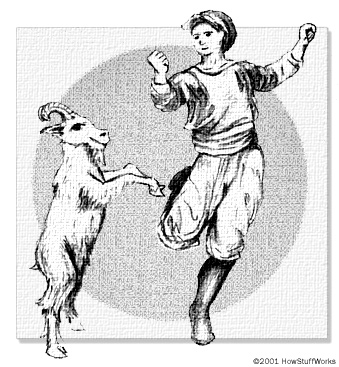 “Dear Kaldi, yes, he herds the goat
“Dear Kaldi, yes, he herds the goat
Tiresome walks without an antidote
Til one day a bush they found
With bright red cherries all around
The goats they ate and chomped the fruit
Then pranced and danced without a flute.”
The dancing goat legend is the most well-known part of coffee’s 1000 year-old history. Roasts are named after it and the Ethiopians get credit for figuring out that if you roast beans then add water, you’ve got one hell of a picker upper.
However, coffee’s original impression on the old world was more scientific. It was recently discovered that coffee can help those that suffer from liver disease, meaning that not much has changed throughout the beans journey.
The first textual mention of coffee was found within a medical book written by the Arabian Astronomer “Rhazes” in the 10th century. He describes Bunchum (coffee) as “hot and dry and very good for the stomach.”
Similar to tea, coffee blossomed through the medical community where it gained ground as a cure for indigestion. The blessed bean was also listed as a cure for the bubonic plague.
When coffee finally made its way out of the Africa and the Middle East to Europe in the 17th century, doctors were fast to praise the drug.
Physician Gideon Harvey wrote in his book Advice Against the Plague (1665), that coffee is:
“A very whoesom and Physical drink, having many excellent vertues, closes the Orifice of the Stomack, fortifies the heat within, helpeth Digestion, quickneth the Spirits, maketh the Heart lightsom, is good against Eye-sores, Coughs, or Colds, Rhumes, Consumptions, Head-ach, Dropsy, Gout, Scurvy, Kings Evil, and many others.”
However, caffeine was not discovered until the late 1800’s which meant that many health warnings against consuming coffee surfaced with the benefits. They must have been operating under the ‘if it makes you feel good, it must be bad’ theory.
In 1674, a group of women drew up a petition against coffee explaining that “this pitiful drink is enough to bewitch Men … and tie up the Codpiece-points without a Charm.” They also claimed it made men too thin and that it caused headaches.
Well the headache part is certainly presently embraced as anyone who has gone without caffeine has felt the afternoon pound. Thankfully our advancements have de-bunked the impotency idea.
Coffee has moved far past the dancing goats as we have found better ways to consume and enjoy the beverage.
However, as the medical community continues to find more antioxidants, cures for liver disease and possibly cancer, coffee remains an ancient drink providing the same benefits as it did hundreds and hundreds of years ago.
No comments:
Post a Comment